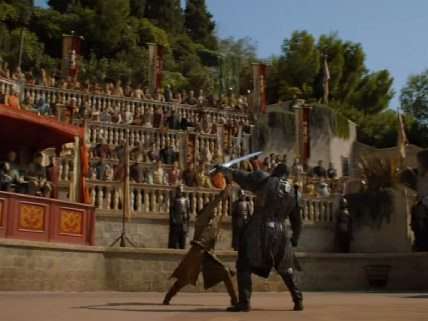Latest Game of Thrones Episode: No Justice In Blood Feuds, Trial By Combat
Was anyone avenged or redeemed amid the senseless violence? Was there any justice?


Spoilers for last night's Game of Thrones episode to follow.
"You raped her. You murdered her. You killed her children."
Prince Oberyn says this over and over again, hoping to wring a confession out of his adversary, Ser Gregor "the Mountain" Clegane. For the audience, their duel is about saving Tyrion's life. But for Oberyn, the duel is about justice for his murdered sister.
By the end of the fight, Oberyn has died gruesomely, the Mountain is likely to follow him to the grave, and Tyrion has been sentenced to death as well. Was anyone avenged or redeemed amid the senseless violence? Was there any justice?
In a word: no.
While previous seasons of HBO's Game of Thrones primarily concerned political scheming and outright warfare, the fourth season's run of episodes has centered on the consequences of medieval brutality for regular folk. Viewers have watched main characters and side characters alike get murdered week after week. This is the end result of a world where noblemen fight over who has the purest bloodline, where religious fanatics burn their enemies to death, where the outcomes of trials are decided by the gods, and the best way to stay alive is to wield a "big fucking sword," in the words of the Hound.
Increasingly, the theme of the show seems to be contained somewhere in Tyrion's story to Jaime about their beetle-smashing cousin. Why did Orson kill hundreds of the little creatures? Why was that his life's calling? There was no reason for it. Perhaps more importantly, there was no way to stop it.
Consider Arya and the Hound's seemingly endless march across the bleak, war-ravaged countryside of Westeros. Everywhere they turn, they see people suffering, dying, failing to defend their homes and their meager possessions from roving hordes of bandits. Some of those bandits are even official forces of the Lannister government—there is no one left to oppose them, and they can do whatever they want. On their way to the Eyrie, Arya and the Hound learn that her Aunt Lysa is already dead. The entire journey—including the life-threatening wound the Hound received—has been for nothing. Arya, who has grown appreciably wiser about her circumstances, can't help but laugh.
Also wiser: Sansa Stark. She is learning how the game is played, and wisely chooses to lie on behalf of her current protector, Littlefinger. Westeros is full of dead Starks who always told the truth and did the right thing. It is fitting that the two remaining Starks with the best odds at survival—Sansa and Arya—have outgrown that tendency.
Is there any way forward, any way out of this world where people are just beetles waiting to be crushed? A quick line at Littlefinger's brief trial is telling. One of the judges, Yohn Royce, mentions that Littlefinger was well-suited to the position of Master of Coin, because it has "always been a grubby job; why not let a grubby man do it?" Royce, like the rest of the ruling elite of Westeros, holds financial matters in disdain. In their eyes, killing each other over blood feuds is an honorable pursuit—managing financial investments is not.
Daenerys, at least, seems sincere in her desire to build a different sort of world. She has abolished slavery. She has proclaimed an end to the brutalization of innocents. She has banished her closest friend and most trusted advisor for scheming and playing political games behind her back. Even so, the way she deals with her enemies—crucifixion—isn't really more humane than what the Boltons do. (Okay, maybe it's slightly more humane.) Ser Barristan watches as Daeny's soldiers take down the corpses of the crucified men. It is difficult to be sure what he is thinking—and we know that he remains optimistic about Daeny despite disapproving of some of her choices—but disappointment wouldn't be a surprise. It always ends the same way.
More on questions of power, the rule of law and market forces in the world of Game of Thrones here.


Show Comments (93)